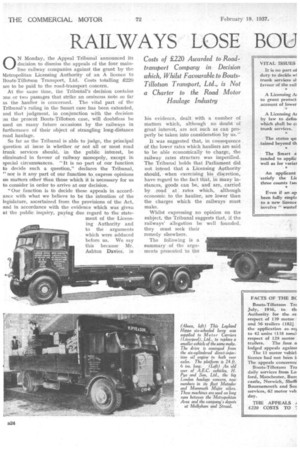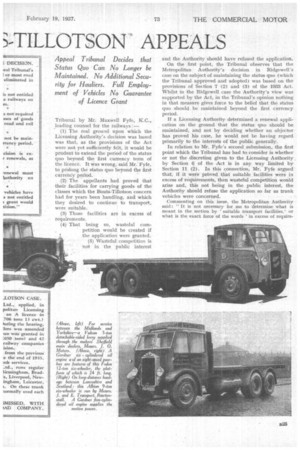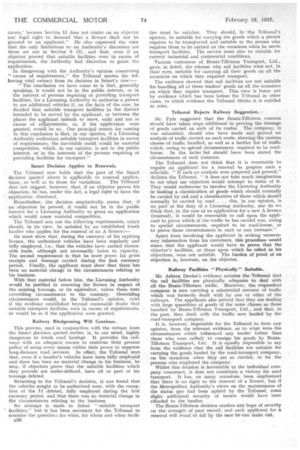RAILWAYS LOSE BOU 3-TILLOTSON APPEALS
Page 42

Page 43

Page 44

If you've noticed an error in this article please click here to report it so we can fix it.
0 N Monday, the Appeal Tribunal announced its decision to dismiss the appeals of the four mainline railway companies against the grant by the Metropolitan Licensing Authority of an A licence to Bouts-Tillotson Transport, Ltd. Costs totalling £220 are to be paid to the road-transport concern.
At the same time, the Tribunal's decision contains Dne or two passages that strike an ominous note so far as the haulier is concerned. The vital part of the Tribunal's ruling in the Smart case has been extended, lnd that judgment, in conjunction with the decision on the present Bouts-Tillotson case, will doubtless be used on many future occasions by the railways in Furtherance of their object of strangling long-distance road haulage.
So far as the Tribunal is able to judge, the principal question at issue is whether or not all or most road trunk services should, in the public interest, be eliminated in favour of railway monopoly, except in special circumstances. "It is no part of our function. to decide such a question," declares the Tribunal, 'nor is it any part of our function to express opinions on matters other than those which it is necessary for us to consider in order to arrive at our decision.
"Our function is tb decide these appeals in accordance with what we believe to be the intention of the legislature, ascertained from the provisions of the Act, and in accordance with the evidence which was given at the public inquiry, paying due regard to the statement of the Licensing Authority and to the arguments which were adduced before us. We say this because Mr. Ashton Davies. in
his evidence, dealt with a number of matters which, although no doubt of great interest, are not such as can properly be taken into consideration by us."
It was suggested that, in consequence of the lower rates which hauliers are said to be able economically to charge, the railway rates structure was imperilled. The Tribunal holds that Parliament did not intend that a Licensing Authority should, when exercising his discretion, have regard to the fact that, in many instances, goods can be and are, carried by road at rates which, although economic to the haulier, are lower than the charges which the railways must make.
Whilst expressing no opinion on the subject, the Tribunal suggests that, if the railways' allegation be well founded, they must seek their remedy elsewhere.
The following is a summary of the arguments presented to the Tribunal by Mr. Maxwell. Fyfe, K.C., leading counsel for the railways :— (1) The real ground upon which the Licensing Authority's decision was based was that, as the provisions of the Act were not yet sufficiently felt, it would be prudent to extend the period of the status quo beyond the first currency term of the licence. It was wrong, said Mr. Fyfe, to prolong the status quo beyond the first currency period.
(2) The• appellants had proved that their facilities for carrying goods of the classes which the Bouts-Tillotson concern had for years been handling, and which they desired to continue to transport, were suitable.
(3) Those facilities are in excess of requirements.
(4) That being so, wasteful corn, petition would be created if the application were granted.
(5) Wasteful competition is not in the public interest and the Authority should have refused the application.
On the first point, the Tribunal observes that the Metropolitan Authority's decision in Ridgewell's case on the subject of maintaining the status quo (which the Tribunal approved and adopted) was based on the provisions of Section 7 (2) and (3) of the 1933 Act. Whilst in the Ridgewell case the Authority's view was supported by the Act, in the Tribunal's opinion nothing in that measure gives force to the belief that the status quo should be maintained beyond the first currency period.
If a Licensing Authority determined a renewal application on the ground that the status quo should be maintained, and not by deciding whether an objector has proved his case, he would not be having regard primarily to the interests of the public generally.
In relation to Mr. Fyfe's second submission, the first point which the Tribunal has had to consider is whether or not the discretion given to the Licensing Authority , by Section 6 of the Act is in any way limited by Section 11 (2). In this connection, Mr. Pyle argued that, if it were proved that suitable facilities were in excess of requirements, then wasteful competition would arise and, this not being in the public interest, the Authority should refuse the application so far as trunk vehicles were concerned.
Commenting on this issue, the Metropolitan Authority said : " It is not necessary for me to 'determine what is meant in the section by suitable transport facilities,' or what is the exact force of the words'in excess of require
ments,' because Section 11 does not confer on an objector any legal right to demand that a licence shall not be granted to an applicant." He also expressed the view that the only limitations to an Authority's discretion are those set out in Section G (2), and that, even if an objector proved that suitable facilities were in excess of requirements, the Authority had discretion to grant the application.
In disagreeing with the Authority's opinion concerning "excess of requirements," the Tribunal quotes the fol lowing vital extract from its decision in Smart's case :— " The conclusion we have come to is that, generally speaking, it would not be in the public interest, or in the interest of persons requiring or providing transport facilities, for a Licensing Authority to authorize a person to use additional vehicles if, on the facts of the case, he decided that suitable transport facilities in the district intended to be served by the applicant, or between the places the applicant intends to serve, exist and are in excess of requirements, or, if the application were granted, would be so. Our principal reason for coming to this conclusion is that, in our opinion, if a Licensing .Authority authorizes suitable transport facilities in excess of requirements, the inevitable result would be wasteful competition, which, in our opinion, is not in the public interest, or in the interests of the persons requiring or • providing facilities for transport."
Smart Decision Applies to Renewals.
The Tribunal now holds that the part of the Smart decision quoted above is applicable to renewal applica tions, as well as to those for variations. The Tribunal does not suggest, however, that, if an objector proves his objection, he has, under the Act, a legal right to have the application dismissed.
NeVertheless, the decision emphatically states that, if an objection be proved, it would not be in the public interest for a Licensing Authority to grant an application which would cause wasteful competition.
The Tribunal sets out the following requirements, which should, in its view, be satisfied by an established trunk haulier who applies for the renewal of an A licence:— He must show that, during the currency of his expiring licence, the authorized vehicles have been regularly and fully employed, i.e., that the vehicles have carried reasonable loads, although not necessarily laden to capacity. The second requirement is that he must prove his gross receipts and tonnage carried during the first currency period. Finally, the applicant must show that there has been no material change in the circumstances relating to his business.
With that material before him, the Licensing Authority would be justified in renewing the licence in respect of the existing tonnages or its equivalent, unless there were overriding circumstances to the contrary. Overriding circumstances would, in the Tribunal's opinion, exist if the evidence established beyond reasonable doubt that suitable transport facilities were in excess of requirements, or would be so if the application were granted.
Railway Bludgeoning Will Continue.
This proviso, read in conjunction with the extract from the Smart decision quoted earlier, is, to our mind, highly dangerous to trunk road haulage. It provides the railways with an adequate excuse to continue their present policy of using every means within their power to suppress long-distance road services. In effect, the Tribunal says that, even if a haulier's vehicles have been fully employed and there has been no material change in his business, he may, if objectors prove that the suitable facilities which they provide are under-utilized, have all or part of his tonnage deleted.
Returning to the Tribunal's decision, it was found that the vehicles sought to be authorized were, with the exception of the 11 deleted, fully employed during the first currency period, and that there was no material change in the circumstances relating to the business.
No attempt is made to define " suitable transport facilities," but it has been necessary for the Tribunal to consider the question:, for what, for whom and when facili
n26 ties must be suitable. They should, in the Tribunal's opinion, be suitable for carrying the goods which a person requires to be transported and suitable to the person who requires them to be carried on the occasions when he needs transport facilities. The service must also be suitable for current industrial and commercial conditions.
Various customers of Bouts-Tillotson Transport, Ltd., gave, in detail, the reasons why rail facilities were not, in their eyes, suitable for carrying all their goods on all the occasions on which they required transport.
The evidence showed that rail facilities are not suitable for handling all of those traders' goods on all the occasions on which they require transport. This view is borne out by evidence which has been before the Tribunal in 'other cases, to which evidence the Tribunal thinks it is entitled to refer.
Tribunal Rejects Railway Suggestion. • Mr. Fyfe suggested that the Bouts-Tillotson concern should have taken steps additional to proving the tonnage of goods carried on each of its routes. The company, it was submitted, should also have made and proved an analysis of traffic carried on each route, showing the various classes of traffic handled, as well as a further list of traffic which, owing to special circumstances, required to be roadborne. In the latter list should have been stated the circumstances of each instance.
The Tribunal does not think that it is reasonable to require an applicant for a renewal to prepare such a schedule. " If such an analysis were prepared and proved," declares the Tribunal, "it does not take much imagination to see' what use objectors would attempt to make of it. They would endeavour to involve the Licensing Authority in making a. classification of goods which should normally be carried by rail and a classification of those which should normally be carried by road . this, in our opinion, is no part of the duty of a Licensing Authority, nor do we think that, in the case of an application for a new A licence (renewal), it would be reasonable to call upon the applicant to prove which of the traffic he has carried was, owing to special circumstances, required to be road-borne, or to prove those circumstances in each or any instance."
Apart from involving the applicant in seeking unnecessary information from his customers, this procedure would mean that the applicant would have to prove that the objector's facilities, or those upon which he relied in his objections, were not suitable. The burden of proof of an objection is, however, on the objector.
Railway Facilities " Physically " Suitable.
Mr. Ashton Davies's evidence satisfies the Tribunal that the rail facilities are physically adequate to deal with all the Bouts-Tillotson traffic. Moreover, the respondent company is now carrying a substantial amount of traffic which was formerly dealt with by one or other of the railways. The appellants also proved that they are dealing with large quantities of goods of the same classes as those handled by Bouts-Tillotson Transport, Ltd., and that, in the past, they dealt with the traffic now hauled by the road-transport company.
It is, however, impossible for the Tribunal to form any opinion, from the relevant evidence, as to what were the circumstances which influenced any trader (other than those who were called) to consign his goods by BoutsTillotson Transport, Ltd. It is equally impossible to say from the evidence that the rail facilities are suitable for carrying the goods hauled by the road-transport company, on the occasions when they are so carried, or for the persons who employed the company.
Whilst this decision is favourable to the individual company concerned, it does not constitute a, victory for road transport. It has, on many occasions, been emphasized that there is no right to the renewal of a licence, but if the Metropolitan Authority's views on the maintenance of the status quo had been upheld by the Tribunal, some slight additional security of tenure would have been afforded to the haulier.
The Bouts-Tillotson decision crushes any hope of security on the strength of past record, and each applicant for a renewal will stand or fall by the case .he can make out.




















































































